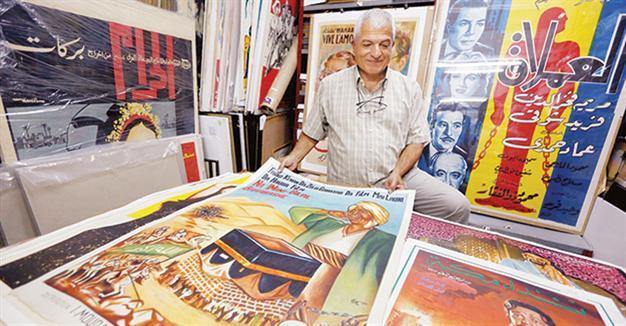History of Turkish cinema in Lebanese collector’s archive
BEIRUT – Anadolu Agency
 Lebanese collector and researcher Ebu Cude sheds light on the recent history of world cinema with his rich film archive - including the posters of many classic and obscure Turkish films.
Lebanese collector and researcher Ebu Cude sheds light on the recent history of world cinema with his rich film archive - including the posters of many classic and obscure Turkish films. Cude, who rented the garage of a building in the Lebanese capital Beirut to hold his film archive, which he also uses as his office, said it started as a hobby but turned into a mission for cinema.
Cude said Turkish films featuring the most famous actors such as Cüneyt Arkın, Türkan Şoray, Fikret Hakan and Hülya Koçyiğit had been translated into Arabic for Lebanese viewers since the 1960s.
“At least 600 out of nearly 12,000 film posters in my archive belong to Turkish cinema,” he added.
Lebanese viewers first met Turkish cinema with the 1964 film “Istanbul’da Aşk” (Love in Istanbul), written and directed by Turkish-origin Egyptian director Seyfeddin Şevket. After this film’s success another Turkish film “Ölüm Vadisi” (Valley of Death), starring Cüneyt Arkın and Lebanese actress and singer Sabah, were released to acclaim in the Arab world, Cude said.
He also added that Turkish producer and director Hulki Saner came to Beirut in 1967 and agreed with Lebanese producer Antoine Haddad to work on joint productions.
“Six Turkish-Lebanese co-productions were made in the same year. These films were the first color films in Arab cinema history. The first film ‘Altın Çocuk Beyrut’ta’ [Golden Boy in Beirut] was directed by Turkish director Ertem Göreç and starred Göksel Arsoy,” Cude said.
‘Local high-budget action films’
Turkish cinema also introduced local action films to the Arab world, he suggested.
“Lebanese actress Sabah acted in 1968 film ‘Beş Ateşli Kadın’ [Five Hot Women], directed by Faruk Acremi and starring Cüneyt Arkın. This film was the first high-budget film here shot in a James Bond-style,” Cude said.
Directors such as Atıf Yılmaz, İlhan Engin and Osman Fahir Seden were involved in numerous Turkish-Lebanese co-productions over the years.
“In 1975, when the civil war occurred, the last Turkish-Lebanese film ‘Anter Kara Ali’ was shot by director Orhon Arıburnu, starring Yeşim Soydan and Silvana Bedrena. It was a historic film,” Cude said.
“There were many reasons why Lebanese film companies wanted to work with the Turks. Low cost was the main factor. Overall, Turkish filmmakers made more than 60 films in both Turkey and Lebanon, and 120 films produced in Turkey were screened to Lebanese viewers. Even though it is believed that the interest of the Arab world in Turkish films and TV series started in the 2000s, the cinematic co-productions show that this interest has a history going back 50 years,” he added.
















